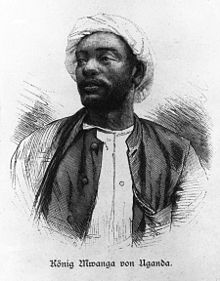Mwanga II
| Ssekabaka Danieri Basammula-Ekkere Mwanga II Mukasa | |
|---|---|
| Kabaka of Buganda | |
 |
|
| Reign | 1884 - 1888 & 1889 - 1897 |
| Predecessor | 1st Time: Muteesa I of Buganda 2nd Time: Kalema of Buganda |
| Successor | 1st Time: Kiweewa of Buganda 2nd Time: Daudi Chwa II |
| Born | 1868 Nakawa |
| Died | 1903 (aged 34–35) Victoria, Seychelles |
| Burial | Kasubi Nabulagala |
| Spouse | 1. Lady Damali Bayita Nanjobe 2. Naabakyaala Dolosi Mwaan,omu, Bakazikubawa 3. Lady Esiteri Nabunnya 4. Naabakyaala Evalini Kulabako 5. Naabakyaala Loyiroosa Nakibuuka Kaddulubaale 6. Naabakyaala Samali Namuwanga Sabaddu 7. Lady Nabweeteme 8. Lady Nakijoba Nabulya 9. Beeza Batwegombya 10. Naabakyaala Ntongo Kabejja 11. Naabakyaala Nabisubi Omuwanga 12. Lady Namirembe Lady Laakeeri Mbekeka 14. Lady Nalwooga, Omuyigiriza 15. Lady Elizaabeti Buteba 16. Lady Nattimba Binti Juma |
| House | Abalasangeye dynasty |
| Father | Muteesa I of Buganda |
| Mother | Abakyala Abisagi Bagalayaze |
Danieri Basammula-Ekkere Mwanga II Mukasa (1868–1903) was Kabaka of Buganda from 1884 until 1888 and from 1889 until 1897. He was the thirty-first (31st) Kabaka of Buganda.
He was born at Nakawa in 1868. His father was Muteesa I of Buganda, who reigned between 1856 and 1884. His mother was Abakyala Abisagi Bagalayaze, the tenth wife of his father's eighty five wives. He ascended to the throne on October 18, 1884, after the death of his father. He established his capital on Mengo Hill.
Mwanga came to the throne at the age of 16. He increasingly regarded the greatest threat to his rule coming from the Christian missionaries who had gradually penetrated Buganda. His father had played-off the three religions, Catholics, Protestants and Muslims, against each other and thus balanced the influence of the European colonial powers that were backing each group in order to extend their reach into Africa. Mwanga II took a much more aggressive approach, expelling missionaries and insisting that Christian converts abandon their faith or face death. A year after becoming king he executed Yusufu Rugarama, Makko Kakumba, and Nuuwa Sserwanga, who had converted to Christianity. On October 29, 1885, he had the incoming archbishop James Hannington assassinated on the eastern border of his kingdom.
For Mwanga, the ultimate humiliation was the insolence he received from the (male) pages of his harem when they resisted his sexual advances. According to old tradition the king was the center of power and authority, and he could dispense with any life as he felt. It was unheard of for mere pages to reject the wishes of a king. Given those conflicting values Mwanga was determined to rid his kingdom of the new teaching and its followers. Mwanga therefore precipitated a showdown in May 1886 by ordering converts in his court to choose between their new faith and complete obedience to his orders and kingdom.
...
Wikipedia
